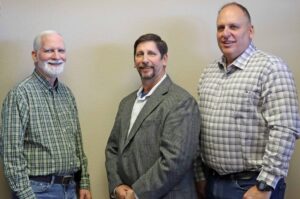
The Surprising Grandeur of Grass
“At this time of year when lawns across the nation are largely dormant, grass may not stand out as one of God’s amazing gifts to man. However, this humble group of plants deserves some special time in the spotlight.”

The creation-evolution debate is full of big words and scientific facts. How can the average Christian remember it all? Prepare to find out in this insightful article.
Evolutionists use dinosaurs as evidence for millions of years. Creationists use dinosaurs as evidence for a young Earth and global flood.
Evolutionists use rock strata and geologic formations such as the Grand Canyon as evidence for millions of years. Creationists use these same strata and formations as evidence of a young Earth and global flood.
Evolutionists use the stars as evidence for billions of years. Creationists use the stars as evidence for a young universe.
Evolutionists use the dazzling variety of plant and animal life on Earth as evidence for billions of years of evolution. Creationists use the dazzling variety of plant and animal life on Earth as evidence for a divine Creator.
Are you starting to notice a pattern here?
In the many years I have spent teaching and talking to people about creation apologetics, one thing I have heard time and time again is “Well I just don’t think I could talk about it the way you do. I just don’t think I could remember all those pieces of evidence for creation.”
Another thing I have often heard, from people who have either walked away from their Christian faith or at least tried to merge it with the teachings of evolution, is that “When I saw all the evidence they had for evolution, I just couldn’t ignore it. They just had so much evidence.”
Both of these statements share a common flaw: the idea that the debate between creation and evolution is a matter of “this evidence” versus “that evidence.”
Imagine, if you will, a field scattered with brown rocks and gray rocks. Two men, Mr. Brown and Mr. Gray, are walking around the field picking up the rocks of their respective color. Each person puts the rocks that he finds in a pile, and at the end of the day, whoever has the biggest pile wins.
This is the subconscious image many people have of the creation/evolution debate.
Praise God that is not the reality of the situation! If it were, no one could hold either belief with any intellectual honesty or confidence, because believing either one would require ignoring real evidence for the other.
Now let’s imagine a different scenario: In the middle of a field is a large pile of rocks, some gray and some brown. Two men are standing next to the pile, trying to determine where it might have come from. One man says, “I think someone must have brought these rocks into this field and arranged them in this pile.” The other man says, “I think there must have been an intense meteor shower over this field, and these rocks are all meteors that fell from the sky and landed in this pile.”
One pile of rocks, two men, two conclusions. And each man can make a case for his point of view, using the same pile of rocks.
This is a much more accurate picture of the creation/evolution debate—the same
pile of evidence, shared by both worldviews, but interpreted in vastly different ways.
And, while it may seem at first glance to make things more complicated, the reality
is that it makes things so, so much easier for the Christian trying to defend and stay strong in their beliefs.
To begin with, a Christian apologist doesn’t have to try to keep a mental tally of “our evidence” versus “their evidence.” All the apologist has to do is learn the basic facts (for example: millions of fossils exist in sedimentary rock layers; stars are billions of lightyears away; DNA is incredibly complex; etc.), and understand that the difference is not in what evidence belongs to whom, but in how the shared evidence is interpreted by people with differing perspectives.
When the interpretation is the focus, there is no need to fear some new piece of evidence being discovered by “the other side,” because once a Christian understands a few basic scientific principles related to creation and the flood, it simply becomes a matter of looking at the objective facts, and asking “How do I interpret this evidence through the lens of those principles?”
A perspective that is based on general principles rather than specific evidences is not only beneficial to the strong Christian apologist defending and sharing their beliefs, but also to the questioning Christian facing doubt after being confronted with evidences they’ve never heard of before and don’t know how to explain. This is because, when we understand the principles of the young Earth approach to geology, paleontology, astronomy, biology, etc. we have the intellectual tools we need to realize that a specific object or fact is not, in and of itself, “evidence” for one view or the other. Rather, it is the
interpretation of that object or fact that is important.
Just because a scientist or university professor or random person on the street interprets an object or fact in a particular way, that does not mean that is the only true interpretation and that there cannot be another. Fossils do not come out of the ground with labels, stars do not blink messages about their age, and DNA does not spell out its origins for us. It is up to us to interpret them as best we can.
This is why I often recommend that, rather than focusing on a handful of specific arguments or mic-drop “evidences,” Christians should focus on the broader concepts of science—the complexity and breathtaking order of DNA, the detailed preservation of fossils, etc.—and use them as interpretive lenses for a much more peaceful, civil conversation.
After all, Mr. Brown and Mr. Gray standing side by side staring at a pile of rocks together is a much more pleasant scene than Mr. Brown and Mr. Gray standing on opposite sides of the field throwing rocks at each other.
Mary Schlegel works from home as a free-lance writer, and has contributed many articles for our Creation Matters Newsletter

“At this time of year when lawns across the nation are largely dormant, grass may not stand out as one of God’s amazing gifts to man. However, this humble group of plants deserves some special time in the spotlight.”

2025 was a great year for the Creation Experience Museum! Here are some exciting words about our vision for the ministry in 2026!

“Evidence. People say they will believe something if there is enough evidence. But on certain subjects many have a priori already made up their minds and are unwilling to change.”

Christmas in Branson, Missouri Light Displays, Family Attractions, and a Free Dinosaur Experience If you’re dreaming of a classic Ozark Mountain Christmas, put Branson, Missouri
